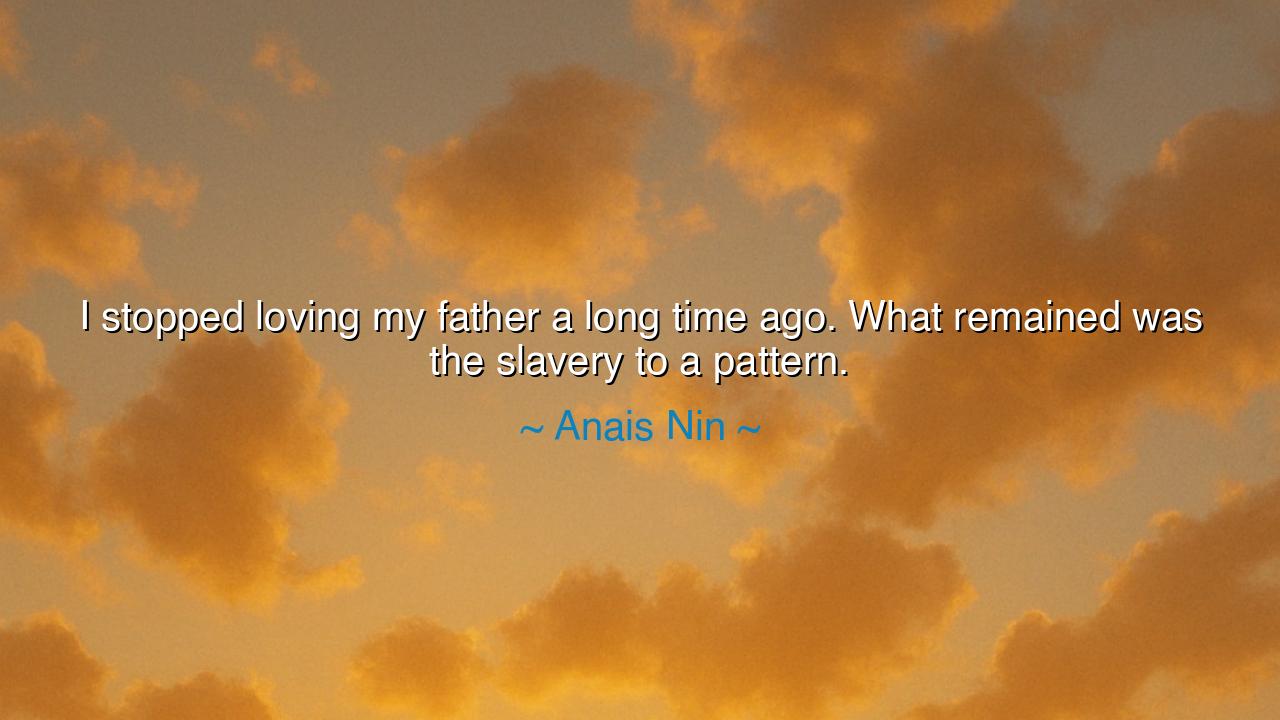
I stopped loving my father a long time ago. What remained was the
I stopped loving my father a long time ago. What remained was the slavery to a pattern.






The words of Anaïs Nin—“I stopped loving my father a long time ago. What remained was the slavery to a pattern”—are like a blade of truth cutting through the illusions of affection and the chains of the past. They come not from bitterness, but from awakening—from the recognition that love, once pure, can decay into habit, and that devotion, once chosen, can harden into bondage. In these few words, Nin unveils a sorrow that many souls carry yet dare not name: the way in which our earliest attachments, especially to our parents, shape the patterns of our hearts long after love has withered. Her confession is not rebellion, but liberation—a breaking of the invisible thread that binds the grown spirit to the shadow of its first authority.
To understand her words, one must know something of Anaïs Nin herself. She was a writer of the soul’s labyrinths, a seeker of hidden truths within desire, memory, and identity. Her relationship with her father was famously turbulent—marked by admiration, disappointment, and complex pain. When she speaks of ceasing to love him, she does not mean hatred. She means that the emotional bond, strained by betrayal and absence, lost its warmth; yet its structure—the pattern—remained. This is the pattern of seeking approval, of re-enacting old wounds in new relationships, of being enslaved not by a person, but by the echo of them within one’s own psyche. Nin’s insight pierces deep into the psychology of inheritance: we repeat what once hurt us, until we learn to see it and set it free.
The ancients understood this truth in another language. The philosophers of Greece and the mystics of the East spoke of ancestral patterns—the unseen laws by which the soul, shaped in its earliest years, moves through life repeating what it has known. To love a parent is to absorb their voice into one’s own thoughts; to stop loving them is not always to silence that voice. It continues to whisper through habit, expectation, and fear. Thus Nin’s “slavery to a pattern” is not the tyranny of her father’s will, but the prison of her own mind still molded by his presence. The ancient saying holds true: “The chains that bind us most tightly are the ones we have learned to wear.”
Consider the story of Emperor Marcus Aurelius, who, though revered as a philosopher-king, was haunted by the stern discipline of his adoptive fathers. Trained from youth to master himself and serve Rome above all, he carried into manhood the burden of their expectations. Though he ruled wisely, his private writings reveal the same struggle Nin describes: the yearning to live freely within patterns inherited from authority. “You are a soul carrying a corpse,” he wrote, lamenting how the body and its conditioning weighed upon the spirit. Like Nin, he learned that mastery is not rebellion against others, but release from the inner slavery of repetition.
In Nin’s words, there is also a universal grief: the recognition that love can turn to duty, and duty can harden into submission. Many live entire lives within patterns learned in childhood—seeking the approval of those who once withheld it, fearing rejection from voices long silent, choosing partners who mirror the pain of the past. This is the cycle of the unconscious, the web spun by early affection and disappointment. Nin’s confession is the act of breaking that web. To name the pattern is to loosen its hold; to see one’s bondage is to begin the work of freedom.
But such freedom is not easy. It requires what the ancients called gnosis—the knowledge of the self. To break the pattern, one must face it, not flee it. One must trace each thread of fear and longing back to its origin, to the moment where love first became control, and tenderness became dependence. Only then can the soul reclaim its strength and choose anew. This is not the abandonment of the parent, but the redemption of the self. Nin’s words are not an attack upon fathers, but an act of healing—a declaration that to grow is to stop living in the echoes of another’s story.
So, dear listener, take this wisdom into your own life. Examine the patterns that bind you—the recurring pains, the familiar disappointments, the voices within that sound like those long gone. Ask yourself: do I act from love, or from habit? Do I choose freely, or do I repeat what was once imposed upon me? The path to peace lies not in resentment, but in awareness. Forgive the past, but do not serve it. Honor those who shaped you, but do not live as their reflection.
Thus, the teaching of Anaïs Nin becomes clear: to love truly is to love freely, without the compulsion of old patterns. The heart that has awakened from slavery is not cold—it is whole. It loves not as a child bound by memory, but as a soul guided by truth. And when one has learned this art, even the wounds of the past become blessings, for they have taught the spirit its greatest power—the power to transform inheritance into wisdom, and bondage into freedom eternal.






AAdministratorAdministrator
Welcome, honored guests. Please leave a comment, we will respond soon